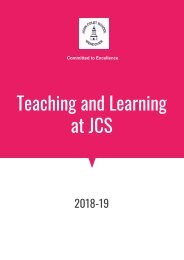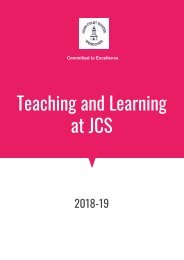Teaching and Learning Staff Booklet
- No tags were found...
You also want an ePaper? Increase the reach of your titles
YUMPU automatically turns print PDFs into web optimized ePapers that Google loves.
Lesson Observation Protocol from Sept 2018<br />
John Colet School uses developmental observations to provide quality feedback on teaching to help teachers reflect on practice <strong>and</strong><br />
develop their teaching. The aim being that all teachers are involved in a continuous cycle of research, development <strong>and</strong> review.<br />
Observations are always developmental <strong>and</strong> will be not be graded <strong>and</strong> only the areas of strength <strong>and</strong> developmental are reported to the<br />
SLT lead for <strong>Teaching</strong> & <strong>Learning</strong>.<br />
Developmental Lesson Observations<br />
Across the year, each member of the teaching staff will have at least one full lesson developmental observation from their line manager,<br />
<strong>and</strong> two shorter (approximately 30 minutes) observations where the focus will be selected as part of developmental discussions with<br />
your line manager or members of the department. The shorter observations can be by a line manager or as a peer observation in<br />
consultation with the line manager. The aim being that each teacher is seen teaching each term in an academic year. The focus of the<br />
observation is agreed in advance <strong>and</strong> is usually suggested by the ‘observee’. The observer will comment primarily on the original focus<br />
of the observation <strong>and</strong> will identify areas of strengths <strong>and</strong> weaknesses <strong>and</strong> in consultation with the observed teacher, agree area/s for<br />
development which will in turn provide the focus for a subsequent developmental observation. No grading or rating is issued,<br />
recorded or offered.<br />
It is expected that every member of the teaching staff has carried out at least one observation during the academic year as part of their<br />
continued professional development. These are arranged with colleagues within or across the school. This may be as part of developing<br />
the CPD focus for the Tuesday Collaborative Planning session.<br />
For all observation, the areas of strength <strong>and</strong> development are shared with the AHT for T&L in order to maintain a central record. This<br />
database is used to help in providing suitable observers depending on the focus of the observation. It will also ensure that every<br />
member of staff is observed AND observes a colleague at some point in the year.<br />
If serious concerns are identified during the observation the line manager <strong>and</strong> SLT link must be informed before feedback is given to the<br />
observed member of staff.<br />
All new members of staff to JCS must be observed by their line manager within their first half term. If there are any areas of serious<br />
concern identified this must be addressed immediately with the SLT link.<br />
Further intervention<br />
From September 2018, further observations or longer observations may be required to support colleagues who need help with specific<br />
classes or areas of practice. This may be part of an Action Plan or through teacher choice as a CPD activity. Teachers are informed if<br />
this needs to take place through a discussion with their Line Manager. Issues such as those listed below may cause this to occur (this<br />
list is not exhaustive):<br />
●<br />
●<br />
●<br />
their external exam results were not rated as good or above<br />
evidence from learning walks, book audits or <strong>Learning</strong> Cycle data highlights a discrepancy between the rating <strong>and</strong> current<br />
performance<br />
there is an issue with one or more of their Teacher St<strong>and</strong>ards<br />
Under these circumstances, further book monitoring or data scrutiny may be required.





